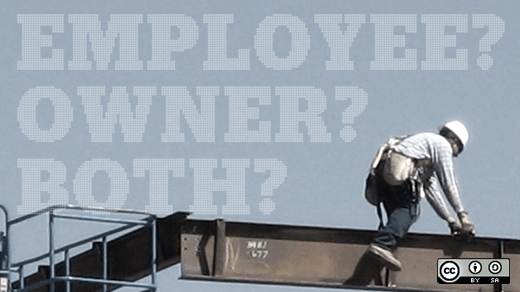Open organizations apply principles from open source software development more broadly. Existing organizations find the open approach appealing because it promises gains in productivity and efficiency—but openness may have farther-reaching consequences than we anticipate or intend.
One influential set of open principles comes from Steven Levy's book about the early history of the computing revolution, Hackers. Levy lays out what he calls "the Hacker Ethic," and it begins with "the Hands-On Imperative":
In a perfect hacker world, anyone pissed off enough to open up a control box near a traffic light and take it apart to make it work better should be perfectly welcome to make the attempt.
Open source fulfils this vision for a significant facet of our society: software. While some obstacles remain—writing software requires a computer connected to the internet, not to mention time and ability—the barrier of restricted ownership is gone. Open source software is owned by no-one and everyone. We have released our code into the commons.
What might happen if we do the same with our organizations?
Open ownership
We're exploring a new understanding of ownership at Gratipay, a startup that helps companies pay for open source software. Yes, we have a binary distinction between our legal owners and non-owners (Gratipay is a worker-owned cooperative, itself a form of workplace democracy). But we prefer to emphasize "ownership" in the broader sense of feeling personally invested in our company—something each individual determines for themselves, resulting in a spectrum of ownership rather than a simple binary.
To echo Levy, if someone is "pissed off enough" about some aspect of Gratipay, we want to empower them to do something about it. Gratipay does not hire or fire people in the traditional sense. Instead, we practice open hiring, with an incremental onboarding process from first contact, through initial contributions (code or otherwise), to participation in our take-what-you-want compensation system, culminating in formal legal co-ownership. Gratipay's legal owners are like a board of directors who exercise long-term stewardship. In day-to-day operations, we take our place alongside everyone else in the collaborative decision-making processes characteristic of open source.
Open hiring and open ownership may seem like obvious, incremental steps in applying open source thinking to organizations, but they raise significant questions about just how far we will be able to go in opening up our organizations, and the challenges we might face along the way.
Down the rabbit hole
Consider that Gratipay has a fork, Liberapay, and some individuals contribute to both. Viewed as two open source projects, this isn't remarkable. But Gratipay and Liberapay are, prima facie, two competing organizations. Imagine Google and Facebook simultaneously employing some of the same key people—without non-compete agreements.
To a certain extent, knowledge transfer between organizations already happens under the surface even between closed organizations, as individuals move from one organization to another. Non-compete agreements can only do so much to staunch the flow. Open organizations have the potential to accelerate this sort of transfer by removing the brakes entirely.
Moreover, competing organizations do explicitly share knowledge and effort in certain circumstances. Linux is a clear example. Isuzu and Honda co-developing a diesel engine is another. But these are not core business functions. Gratipay and Liberapay, on the other hand, divulge their public issue trackers and strategic roadmaps.
Open hiring and open ownership seem to promise a more fluid economy, where each of us as individuals has a high degree of autonomy to move around between organizations, and to participate in multiple organizations simultaneously. That could also be a net benefit for society as a whole, since knowledge drives innovation, and optimizing resource allocation drives efficiency. But what does that mean for organizational identity and longevity? Is it even possible for existing organizations to convert to such a thorough vision of openness within the current framework of fiduciary responsibility?
To begin to understand how challenging this level of openness can be for existing organizations to achieve, consider the example of Balanced Payments, a startup whose adoption of openness helped them gain mindshare in a crowded market. However, openness ultimately contributed to their downfall. Balanced developed an important new feature in the open together with their user community, but someone else was silently watching: Stripe, a major competitor. Days before Balanced's scheduled roll-out, Stripe brought to market a rushed version of the same feature, stealing Balanced's momentum and sealing their fate. Are deeply open organizations like Balanced doomed from the start? How can they gain a foothold in the market against closed incumbents? Given the challenges, is there sufficient incentive to create open organizations in the first place?
The Balanced owners and employees moved on to other organizations: an instance of the knowledge transfer that happens between organizations, open or not. If Liberapay ends up solving the problem of funding open source vastly better than Gratipay, then those of us working on Gratipay can easily migrate our efforts to Liberapay, because Liberapay has inherited Gratipay's open hiring practices. What if the same were true of Balanced and Stripe? Would the transition have been more or less painful for the individuals involved? Would it have been better or worse for the two organizations? For the payments industry?
If I subscribe to the Hacker Ethic, my primary commitment is not to perpetuate an institution but rather to solve a problem. For a hacker, the lasting benefit of a problem well-solved outweighs the temporary pain of a bruised ego or a shuttered brand. Will we hackers be able to realize this comprehensive vision of the open organization, one that includes open hiring and open ownership? Will we be able to create a critical mass of these deeply open organizations, so that early adopters and eventually the early and late majority can find a livelihood there?
Today, imagining an organization of 10,000 or 100,000 people practicing this level of openness might be difficult. But if we are able to evolve our organizations in this direction, then we may some day live in a world in which a sufficiently motivated hacker can fix not just a software bug, but a traffic light.






8 Comments